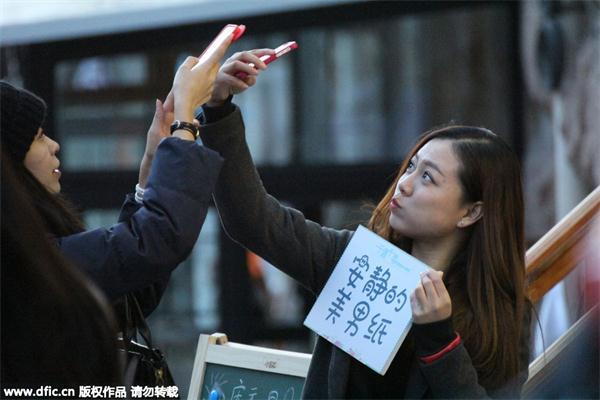Thumbs down on vulgarity
Updated: 2015-10-21 07:36
(China Daily)
|
|||||||||||
 |
|
A girl pose a photo in front of a cafe holding a board written popular buzzwords. [Photo/IC] |
The Ministry of Education's vow to say no to vulgar words used on the Internet is a welcome and necessary move to help promote a healthy society.
In a recent report on China's linguistic conditions in 2014, the 10th of its kind, the ministry said the use of Internet words, some of which are vulgar ones, in TV programs, textbooks and dictionaries, has made it necessary to curb the abuse of coarse words online.
With the booming development of the Internet, a number of new words have become popular in recent years, such as zheng nengliang, positive energy, and dianzan, thumbs up, which not only reflect the agility of the Chinese language, but also add convenience to communicating.
But along with these popular buzzwords some rude and even vulgar words have also cropped up, as a tool to vent discontent and vilify others. Their creation has not only interrupted and sabotaged normal and friendly relations in the virtual world, but has also sometimes spread such infectious negative sentiments to the real world.
Given the accessibility of the Internet to almost all people in present-day society, the unblocked dissemination of such coarse words has tainted the otherwise-healthy cyber environment and in particular caused negative influences on juveniles who are more vulnerable to unhealthy content.
The virtual world should not become a domain that is not subject to the restraint of civilized words and deeds. Its popularity has brought conveniences to people's daily life, but this should not be an excuse for ignoring its unhealthy developments, including the use of offending words.
All media outlets and users should join the campaign and voluntarily resist the use of coarse words as part of the effort to create a purified environment for communication.
Related Stories
Debut director is as proud as a peacock Nostalgia is the catchword 2005-01-28 09:26
'Depression' is the catchword among college students 2004-02-08 09:25
Discussions on Weibo bring positive energy 2015-02-09 15:42
Positive energy for future 2014-10-01 07:58
Today's Top News
Xi tells UK parliament of 'first achievements'
Chinese students out in force to greet President Xi
Xi's visit to unlock $46 billion in commercial deals
Xi touches down in London
UK hailed for closer relations with China
Chinese president leaves for visit to Britain
UK visit to set course for ties, says Xi
Full text of Reuters' Q&A with Chinese President Xi
Hot Topics
Lunar probe , China growth forecasts, Emission rules get tougher, China seen through 'colored lens', International board,
Editor's Picks

|

|

|

|

|

|






